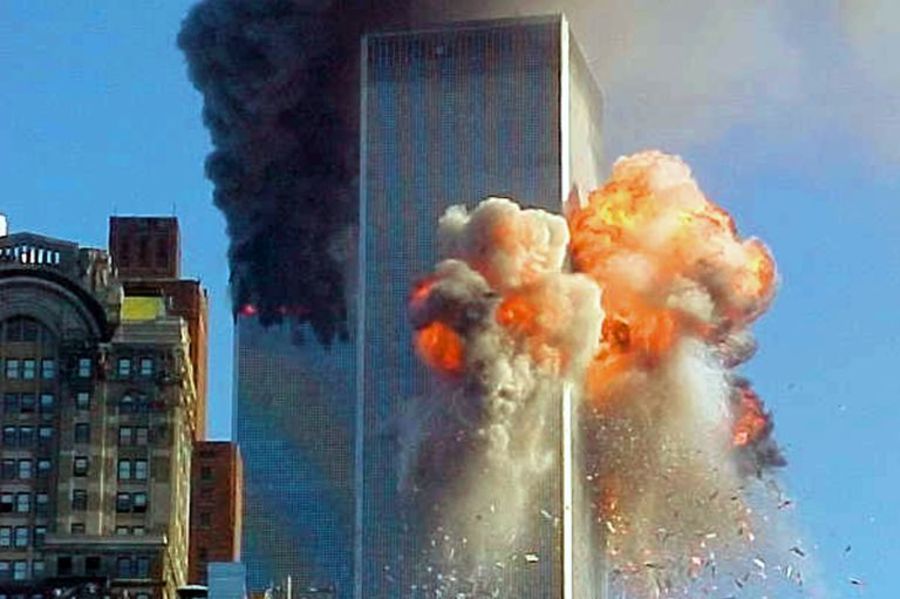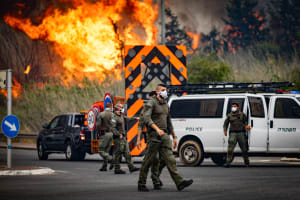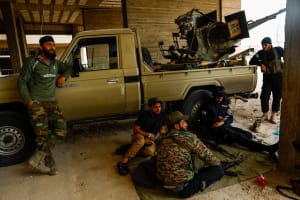Where were you on 9/11? I was writing a novel about a kamikaze attack on America
Evil is rising again — are we ready?

JERUSALEM, ISRAEL — Few will ever forget what they were doing on September 11, 2001, when they first heard the news that the United States was under attack by radical Islamic jihadists using jet planes on kamikaze missions.
I certainly never will.
On that beautiful, sunny, crystal clear Tuesday morning, I was putting the finishing touches on my first novel, a political thriller — The Last Jihad — which opens with radical Islamic terrorists hijacking a jet plane and flying an attack mission into an American city.
What’s more, I was doing so in a townhouse barely 15 minutes away from Washington Dulles Airport, where, at that very moment, American Airlines Flight 77 was being seized and flown right over our home towards the Pentagon.
At the time, I had no idea anything unusual was underway.
I had begun writing Jihad in January 2001.

A literary agent in Manhattan had read the first three chapters that spring. He was convinced that he could get it published, and urged me to finish it as quickly as possible. I took the advice seriously, working feverishly to get the book done before my savings account ran dry.
As had become my morning ritual, I had breakfast that fateful day with my wife, Lynn, and our kids, threw on jeans and a t-shirt, and settled down to work on the novel’s second to last chapter.
I didn’t have the radio or television on. Rather, I was simply typing away on my laptop when, about an hour later, Lynn burst into the house and said, “You will not believe what’s going on.”
She quickly explained that after dropping off two of our kids at school she had turned on the radio and heard that the World Trade Center had been hit by two planes.
We immediately turned the television on and saw the horror begin to unfold for ourselves.
We saw the smoke pouring out of the North Tower. We saw the constant replays of United Airlines Flight 175 plowing into the South Tower, and erupting into a massive ball of fire.
And then, before we could fully process it all, we saw the World Trade Center towers begin to collapse.
Wherever I speak around the world, people ask me what my first reaction was, but I don’t recall thinking that my novel was coming true.
Instead, I simply remember the feeling of shock.

I remember calling friends at the White House and on Capitol Hill, and my agent, Scott Miller, in New York, hoping for word that they were safe but unable to get through, with so many phone lines jammed.
I remember Lynn and I getting our boys back from school and the friends who came over to spend the day with us.
We tracked events on television, emailed other family and friends around the country and around the world with updates from Washington, and prayed for those directly affected by the crisis, and for our president to have the wisdom to know what to do next.
Were more attacks coming?
Would there be a 9/12, a 9/13, a 9/14?
Would there be a series of terrorist attacks, one after another, as Israel experienced for so many years?
It was not until sometime in late November or early December that events began to settle down enough for my thoughts to turn back to The Last Jihad.
What was I supposed to do with it?
No one wanted to read a novel that opened with a kamikaze attack against an American city. It was no longer entertainment. It was too raw, too real. So I stuck it in a drawer and tried to forget about it.
But then something curious happened.
Lynn and I were watching the State of the Union address in January of 2002 when President George W. Bush delivered his now-famous “axis of evil” line, warning all Americans that the next war we might have to face could be with Saddam Hussein over terrorism and weapons of mass destruction.

Lynn and I just looked at each other as if we were living in an episode of The Twilight Zone.
After all, it was one thing to write a novel that opened with a kamikaze attack against America by radical Islamic terrorists.
It was another thing to write a novel in which such an event triggers a global War on Terror and then leads the president of the United States and his senior advisors into a showdown with Saddam Hussein over terrorism and weapons of mass destruction (WMD).
But that’s exactly what happens in the novel.
Scott Miller called me the next day.
“Do you work for the CIA?” he asked.
“No, of course not,” I assured him.
“Sure, sure,” he replied. “That’s what you’d have to say if you did work for the CIA and just couldn’t tell me.”
Scott believed that the dynamic had just changed dramatically and that publishers would now be very interested in The Last Jihad.
The country had largely recovered from the initial shock of the 9/11 attacks.
We were now on offense against the Taliban in Afghanistan.
People were reading everything they could get their hands on regarding the threat of radical Islam.
And there were no other novels in print or on the horizon that could take readers inside the Oval Office and White House Situation Room as an American president and his war council wrestled over the morality of launching a preemptive war against the regime of Saddam Hussein.
As such, Scott wanted to move quickly.

Jihad needed a few tweaks – acknowledging, for example, that 9/11 had happened and, thus, setting my fictional story a few years into the future – but other than that, it was essentially ready to go.
A publisher quickly agreed to take a risk on this unknown author and give the book a chance to find an audience.
The Last Jihad was rushed through the publishing process and released on Nov. 23, 2002, just as the international debate over Iraq, terrorism and WMD reached a fevered pitch.
The novel caught fire immediately.
Jihad sold out in many stores in less than 24 hours and prompted nine reprintings before Christmas.
In less than 60 days, I was interviewed on more than 160 radio and TV talk shows, including Rush Limbaugh, Sean Hannity, Fox and MSNBC.
The questions were as much about the novel, itself, as the story behind the novel.
How could I possibly have written a book that seemed to foreshadow coming events so closely?
Was it a fluke?
Did I get lucky?
Or was there something else going on?
More importantly, what did I think was coming next?
As you will see if you read the novel, there are a number of significant differences between my fictional scenario and what really happened.
But people kept asking me about the striking parallels to real life.
During such interviews, I tried to focus people on the bigger picture, summing up the theme of the novel with this line: “To misunderstand the nature and threat of evil is to risk being blindsided by it.”
The truth is, America was blindsided on 9/11 by an evil that few saw coming.
What’s more, those attacks were just the beginning of a long war against the forces of radical Islam, and more recently against the forces of apocalyptic Islam.
The most important issue we face in the post-9/11 world is whether we have learned anything as a result of that terrible Tuesday.
Do we truly understand that the forces of evil are preparing to strike at us again when we least expect it?
Do we truly grasp that the ultimate goal of the jihadists is not to terrorize us but to annihilate us?
Are we willing to take any actions necessary to defend Western civilization from extinction?
Or are we going to elevate peace over victory, retreat from the world, and simply hope for the best?
It has now been 22 years since that horrifying Tuesday, and almost 21 years since The Last Jihad was first published.
I have written more novels, most of them about worst-case scenarios that could occur in the U.S. and the Middle East if Western leaders are blindsided by evil they don’t truly understand.
Together, these books have sold some five million copies and have spent months on the national best-seller lists.
Jihad alone spent 11 weeks on the New York Times hardcover fiction best-seller list.
Such broad interest is, I believe, an indication of the anxious times in which we live.

While we no longer face Saddam Hussein, now we face an Iranian regime threatening to wipe the U.S. and Israel off the map and build a global Islamic kingdom or caliphate.
We’re witnessing the largest ground war in Europe since World War II and Russia's Vladimir Putin threatening to use nuclear weapons in Ukraine.
We’re seeing Communist China threatening to invade Taiwan and establish hegemony over the Pacific.
And let’s not forget about North Korea threatening to hit Los Angeles with a nuclear ICBM (intercontinental ballistic missile).
All of this raises troubling new questions: What is coming next?
How bad will it be?
Where will I be when it happens?
And am I ready to meet my Maker if, God forbid, I’m in the wrong place at the wrong time when evil strikes again?
How would you answer such questions?
I believe they are as relevant today — even urgent — as they ever were.

Joel C. Rosenberg is the editor-in-chief of ALL ISRAEL NEWS and ALL ARAB NEWS and the President and CEO of Near East Media. A New York Times best-selling author, Middle East analyst, and Evangelical leader, he lives in Jerusalem with his wife and sons.
You might also like to read this:















